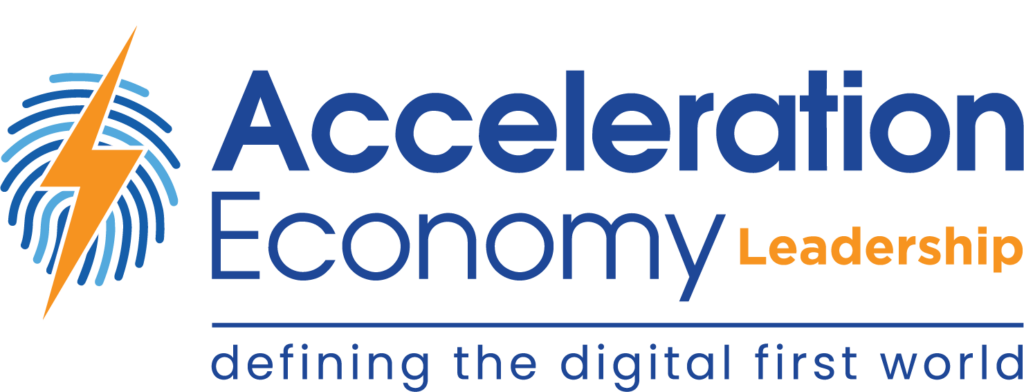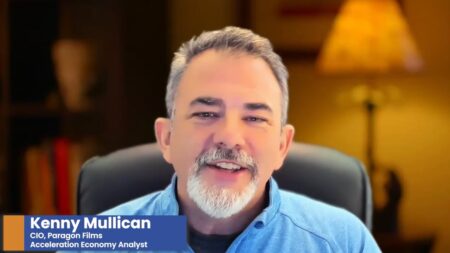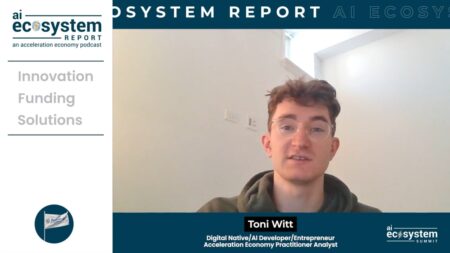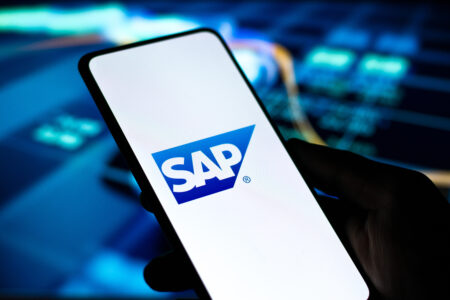In Episode 21 of the Growth Swarm podcast, John Siefert, Bob Evans, Scott Vaughan, and Tony Uphoff continue the discussion around digital transformation – specifically the data modernization aspect – and focus on some of the key considerations for CXOs and other leaders who are embarking on today’s most essential business transformation journey. From culture shifts to a full understanding of how to operationalize data in real-time, certain aspects must be addressed for any successful data modernization project to succeed.
Highlights
00:11 – John introduces his co-hosts, Bob, Scott, and Tony, and then sets up this week’s discussion, which expands upon the idea of digital transformation as business transformation that was discussed in Episode 20 last week. John says that so much of what we call digital transformation is actually data modernization, which could then be extrapolated to business modernization. On that note, he mentions Acceleration Economy’s Data Modernization Digital Battleground, which takes place online on October 27th. John says the event, which features a panel of CXOs answering questions about data modernization, intends to “hold a mirror up to the market” so that the panelists can give industry professionals “real world, practical advice and guidance” on this important topic.
01:45 – The Data Modernization Digital Battleground will focus on themes such as access, security, data cleanliness, where the data is stored, and how it is used – all from a data architecture, data access, and data security perspective.
02:12 – John references the content on data modernization that is being published by Acceleration Economy Analysts, such as Wayne Sadin, Chris Hughes, Robert Wood, Kenny Mullican, and Pablo Moreno, as well as a list of recommended data modernization vendors. In addition to larger companies such as Snowflake, IBM, and Amazon, the list includes upstart organizations such as Couchbase and Redis that are defining the category of data modernization.
02:56 – John asks for Bob’s perspective on the balance between Cloud Wars Top 10 companies and newer organizations that are playing into “the developer-first, cloud-first model of data strategy.”
03:16 – Bob says that it is an extraordinary time for data modernization and the category can be viewed from two angles – what the new wave of vendors and the established vendors are doing to bring their expertise into the new era of data modernization and what customers can do. After speaking with a Chief Data Officer of a well-known, U.S.-based industrial company, Bob says data must be harmonized and then optimized so that it can be used by many people across the organization and then become normalized and part of everyone’s workflow. Otherwise, it’s “just talk.” He said that part of the cultural shift is getting the workforce to understand that they aren’t just turning out physical products, but also data in order to deliver a better customer experience. He says the “wild new tools of data modernization are great,” but organizations must not only get caught up in the dazzle of data modernization, but also continually be thinking about what happens over on the customer side.
Join us on October 27, 2022 for Acceleration Economy’s Data Modernization Digital Battleground, a digital event in which four leading cloud vendors answer questions on key considerations for updating data strategies and technology. Register for free here.
05:02 – John references Acceleration Economy analyst and Paragon Films CIO Kenny Mullican’s recent piece, “Why Data Modernization Is About Quality, Policies, and Cybersecurity,” which breaks data modernization into three elements: data inventory, data migration, and data iteration.
06:13 – Tony says that the key to unlocking business growth and value is data and the value an organization places on its data. He says that data has taken a critical role in companies and has become the “center of gravity for digital and business transformation.” He says data modernization is a way to “sweep up the technical debt that is holding back the value of data” and also find the tools to feed data back into the system. He agrees with Bob that data modernization has introduced the world to many new tools, but “the key is less about these tools and more about what do we do with this data.” This means the system gets smarter, we get smarter, and we make better decisions.
07:32 – Tony tells John that today, customers are seeing value in data. He says the world is in an interesting era where data is the centerpiece of business operations but encourages organizations to reimagine the ways data can impact a customer and impact the way a business is run, rather than get caught up in the individual tools and technology.
08:45 – The employee experience element has become an important aspect in creating a data-driven culture, says John, which starts with a data modernization project. He shares a quote from Tony’s recent piece on the data modernization process and data strategy. He says that, in essence, this quote confirms that tools are important in data modernization, but they must be put to use to inform decision-making. John asks Scott, who has recently published a piece on creating a culture of data, for his take on the matter.
10:38 – Scott says that if data cannot be activated or used, “that is where it can stall,” regardless of whether or not the company has a culture of data. He explains that once a company starts to feed data back into its system, it must be taken to customers and used, and everything from how it’s activated to how to co-create with it must be addressed. What is done with the data is important and offers a competitive advantage. Scott says that he “loves” that some of the Cloud Wars Horizon companies, such as Couchbase, are challenging the traditional database mentality, since this truly is an area that is elevating right now in a time when we need it.
13:11 – Tony says that a critical piece of data modernization is real-time use of data, versus data that used to be a trailing indicator of a past event. Data modernization today is about using data and feeding it into a live system, thereby operationalizing it. This is a big shift that people must understand. He says he has noticed how companies have struggled with understanding how to move more quickly with the use of data. Data modernization is a way to understand how to use real-time data and feed it back into a business to grow faster, says Tony.
15:48 – John predicts that in the not-too-distant future we may see “data-bursting,” which is similar to cloud-bursting, that would use real-time activity to get “data bursts” as a way to quickly define the immediate next steps for a business.
16:11 – Bob agrees with John and says that as an industry, a tech industry, we must go beyond the previous standards of data collection and usage and describe these concepts in terms of what 21st-century businesses are doing and how they think.
18:29 – There has been a fundamental shift in the mindset of using data to justify decision-making, says Scott. He describes this shift as “unlocking and activating data to co-create with customers to understand what is happening.” So we go from “using data to prove stuff, to using data to do stuff.” Scott mentions a McKinsey study, which reveals that $165 billion was invested in 2021 on applied AI, and 40 billion on trusted architecture and digital identity for data and digital-enabled products and services. Scott covered some of these trends in his recent article, “How Artificial Intelligence Is Unlocking the Possible for Marketers.”
20:16 – John reiterates how so much of what we’re seeing today is data as a business enabler, but reminds us how security is a key part of this shift that all CXOs, but particularly CISOs, must consider. This is because security defines the access and the governance against all of that data, which is another huge aspect in regulated industries in particular. This is much easier to do in a cloud environment versus a traditional on-premise environment, which is data modernization in a nutshell. John references a recent profile by Tom Smith on Okera, which helps with these kinds of operations, specifically, data access at scale.
21:45 – John mentions Pablo Moreno’s recent analysis on data modernization, which covers some of the business benefits that organizations get beyond the core data modernization, because “as you modernize that data process, you’re actually changing the way you pay for stuff.” This changes the model for companies in how they’re managing their spend against their data strategy.
23:38 – John asks for everyone’s predictions on what data modernization will look like over the next two years.
23:57 – Tony says there will be an acceleration within the context of the noticeable trends in data modernization. He expects to see “more of the same of what has been seen” in terms of real-time data and agrees with Scott that companies will shift to use more day-to-day operational data versus data that is reflected upon.
25:45 – Scott says that machines accelerate the ability to harness data and put it back into the system for what he refers to as data citizens. He says AI-powered machines give a “big boost” in collecting and activating data.
26:45 – Bob predicts that both boards and CEOs will take on a mindset of data culture and strategy because if not, organizations will “not get there as quickly as their competitors do.”
28:25 – Within the category of data modernization, John thinks there will start to be consolidation, which will make it easier on customers. He also predicts a rise in citizen developers using BI tools to extract information, bringing data out of “the back room into the front room.” For organizations embarking on their data modernization journey, John recommends reading a recent piece by Wayne Sadin on data modernization and points out why data should be clean because “if it’s garbage data going in, it’s garbage data going out.”









